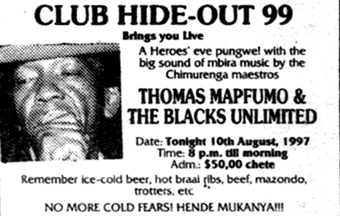 The continuing popularity of Mapfumo's Chimurenga music in Zimbabawe: an advertisement for Mapfumo's concert during the 1997 Hero's Day celebrations. Click for another example. [Added by GPL.]
The continuing popularity of Mapfumo's Chimurenga music in Zimbabawe: an advertisement for Mapfumo's concert during the 1997 Hero's Day celebrations. Click for another example. [Added by GPL.] The continuing popularity of Mapfumo's Chimurenga music in Zimbabawe: an advertisement for Mapfumo's concert during the 1997 Hero's Day celebrations. Click for another example. [Added by GPL.]
The continuing popularity of Mapfumo's Chimurenga music in Zimbabawe: an advertisement for Mapfumo's concert during the 1997 Hero's Day celebrations. Click for another example. [Added by GPL.]
Mapfumo's use of pronouns has the effect of excluding some and including others, thereby showing the musician's relationship to both the audience and the subject of his criticism. This "we" implicates the addressee in the content of the discourse and is therefore ostensibly more intimate and expresses solidarity at the same time casting the subject of criticism as 'them', who are not "us". It is this 'we' which marks "them" and "us" in political discourse where the goals of persuasion and coercion are often sought.
In light of this theoretical background it is interesting to note that although Mapfumo is an individual musician, he did not use first person singular in most of his song texts. Instead, he used the inclusive 'we' and "us". For example in the song "Kuyaura" (Suffering) this is expressed in the pronominal infix ti- in "vatiudze zano" which is equivalent semantically to the inclusive "us". Therefore when in this song he says, "Where are our ancestors to lead us? Where are the nationalists to guide us ? Where are the witches to give us their charms", the implication that Mapfumo himself is part of the audience he is addressing and also speaking on behalf of. This potentially kept him in touch with his audience.In the few songs where he used first person singular, Mapfumo interchanges it with the inclusive "we" within the same song as in "Pfumvu Paruzevha" (Trouble in the Reserves), where the experience is expressed in the first person in the first verse but becomes generalised in the other verses. This presents him as suffering together with the audience, as if he was saying "My problems are our problems" and vice-versa. Such a stance projects him and his audience at the same level, as fellow sufferers of the same system. It also sharpens the "them" and "us" dichotomy, thus potentially conscientising the audience on the power of a collective force towards one shared goal. It has been argued that unity among all the Zimbabweans played an important role in winning Zimbabwe its independence. Nathan Mathema in the poem "A Maze of Blood" (Kadhani and Zimunya 1982: 171), also dramatises the importance of unity in the struggle for Zimbabwe
[from Alice Dadirai Kwaramba, Popular Music and Society: The Language of Chiumurenga Music: The Case of Thomas Mapfumo in Zimbabwe. Oslo: University of Oslo, 1997. pages 62-63. Available from Department of Media and Communications [[email protected]].